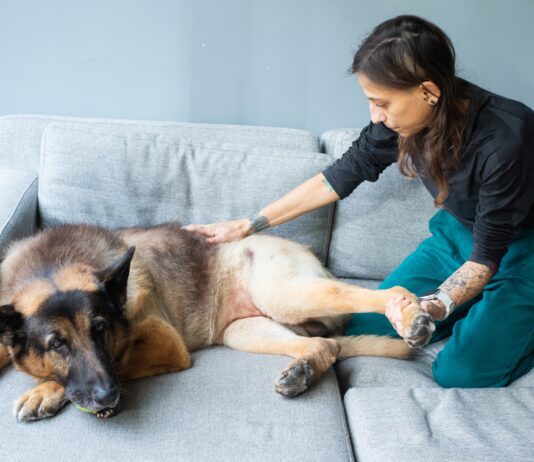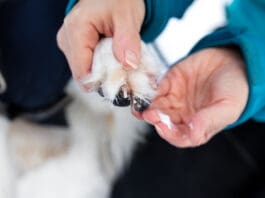Treating Your Dogs’ Injuries Holistically
No matter how careful you are with your dog's everyday health needs, it's in his nature to be incautious and inquisitive. And that sometimes results in injury. Odds are, it's just a matter of when. However, your conviction to treat your dog with natural remedies is put to a real test when you are faced with an emergency. Whether your dog is severely injured in an accident or scraped and cut from a fight, your first reaction should be to remain calm, remember what you know, and think holistically. Just as you plan and prepare your dog's daily meals and training, advance planning and preparation for the unthinkable accident may help save your dog's life during the critical time between the beginning of the emergency and access to veterinary care.
Massaging Your Dog Promotes Circulation and Well Being
Massage is a broad discipline that includes Swedish, Western, and sports massage techniques to name only a few. This series on canine massage will discuss several methodologies, but will begin by describing one of the basic Swedish massage movements and its physiological effects and benefits. Swedish massage has its origins in a system devised by Pehr Henrik Ling, a Swedish physiologist and gymnastics instructor who is considered the father of Swedish massage and also the father of physical therapy.
Apple Cider Vinegar: A Holistic Remedy for Dogs
What's new in holistic pet care? Try apple cider vinegaror, as its fans call it, ACV. Okay, it isn't new, but this centuries-old product is enjoying new popularity in canine circles. Those who are old enough remember when Dr. D.C. Jarvis of Vermont made apple cider vinegar a household word with his 1958 best seller Folk Medicine. According to Jarvis, native Vermonters used cider vinegar to cure migraine headaches, arthritis, diabetes, obesity, indigestion, and a host of other ailments.
Flower Essence Therapy For Dogs
We know from innumerable modern research studies that a person's immune strength and resistance can be improved through a positive mental outlook, and that people who are happy heal more quickly than emotionally depressed people. Stated simply: emotional states can affect the physical body. Most veterinary health care professionals would probably agree that the principle is true for animals, too. For example, most healthy dogs are usually happy dogs or is it the other way around? And have you noticed how, just as with people, very often an anxious or angry dog also tends to be prone to more injuries and illness than a content and cheerful dog?
Dog Injury Solutions: Calendula and St. John’s Wort
Calendula Officinalis (also known as the Marigold plant, but usually called calendula) and hypericum (also known as Saint John's Wort), are very safe, yet incredibly effective at cleaning the site of an injury and encouraging the body to heal. Homeopathic and herbal preparations of calendula and hypericum have proved invaluable in modern-day holistic dog care. In fact, it's difficult to find an herbal wound preparation that does not contain some form of one or both of these potent plants.
A Holistic Dog Behavior Consultant’s Opinion on Dog Door Aggression
As a holistic behavior consultant, I believe that most problems people experience with their dogs are not really dog problems but rather communication problems. Dogs don't have problems being dogs; they have problems being dogs who live with humans. Most humans don't even know how to communicate with each other! Every interaction you have with a dog teaches the dog something about living with a human.
Using Homeopathic Remedies to Help Your Dog
Last month, we looked at how homeopathy works to help a patient’s body heal itself. In this article, we’ll explore how you can use homeopathic remedies to help your dog – and suggest when your dog would be better off in the care of a veterinary homeopath. In the hands of a skilled practitioner, homeopathy can bring amazing cures of deep-seated illness. But it can also be used by the layperson to treat minor acute problems. What kinds of ailments can you tackle at home? “You can always treat injuries,” says veterinary homeopath and author Richard Pitcairn, DVM. The best candidates for at-home treatment include bite and puncture wounds, insect bites and bee stings, minor burns, and digestive upsets.
Holistic Veterinarians Take on The Annual Vaccination Schedule
Holistic veterinarians have long decried the annual vaccination schedule recommended by many conventionally trained veterinarians for all dogs. Many holistic veterinarians suspect that many of the complex ailments that plague our modern dogs – from allergies to digestive problems to aggressive behavior and so on – have their roots in immune system problems brought on by excessive and unnecessary vaccination. However, many of us are convinced by our veterinarians that our dogs won’t be safe unless they receive these boosters every year. Fortunately, a recent study indicates that most dogs retain humoral antibody protection from past vaccinations for longer than previously thought.
Mastering Canine Massage Skills
Several readers have contacted me with reports of their growing massage skills. Learning and practicing each new massage technique is a thrill, and now that you have accomplished several techniques it is time to put them all together into a massage routine for your dog. The following routine is just a guideline to help get you started. Once you have tried it a time or two, you will naturally sequence the massage moves into a routine to suit you and your dog. Soon each massage will be different and will meet your changing needs and moods.
Extending Your Dog’s Life Holistically
Some dogs have a rough start in life. Consider BP, the 50-pound black-and-tan Shepherd-mix owned by Lucia Colbert of Cordova, Tennessee. BP was dumped in a neighborhood and left to fend for herself until rescued by Colbert in 1988. Colbert took the thin and sickly dog to the vet: BP had a host of internal parasites, including heartworms; part of her tongue was missing; and she had a chest full of buckshot (discovered later on a chest x-ray). “I knew she’s hadn’t had a piece of cake for puppyhood,” says Colbert. Once adopted, BP thrived. She enjoyed a good life with Colbert, a professional tennis player and triathlete. BP jogged daily with Colbert and sat by the tennis court while she taught.
Holistic Healing in The Form of Prayer
The second attempt to find a home for Suki, a five-month-old Akita, had met with failure. The well-intended, very loving couple were in tears as they brought her back to the Akita Rescue Family in Lewisberry, Pennsylvania. The normal expectations they had of her falling into place as the puppy of their “pack” had been quickly dashed. Suki had relentlessly attacked Lika, their 13-year-old spayed Chow mix, so viscously that the formerly “alpha” female became fearful and intimidated. She spent the last days of Suki’s short stay in a hiding place under the stairwell.
Canine Massage Used For Damaged Muscle Tissue
Watching the smooth, even gait of a happy dog as it trots or gallops across a field is pure delight. It is obvious that all of the muscles and joints are working in harmony. We don’t often stop to think about the importance of muscles as a dog stands quietly at our side, but the same muscles that act antagonistically to move joints as the dog runs must cooperate to stabilize those same joints and change the limb into a rigid support when standing. It’s really an amazing relationship.
















